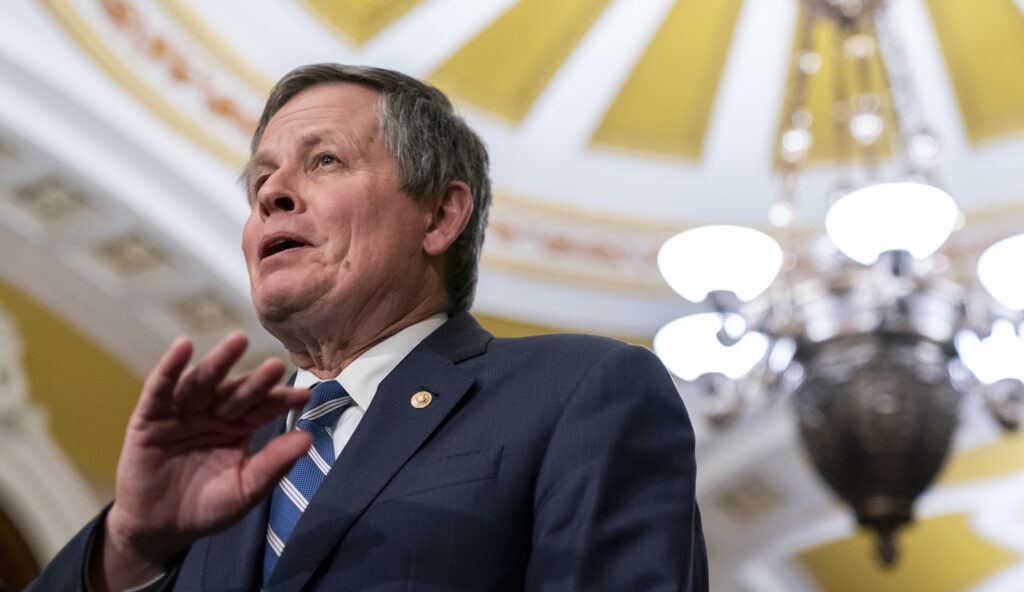Senate leadership is mounting an all-out offensive to pitch Ukraine border legislation that will be brought to the floor this week.
But no sooner had the legislative text been released Sunday night than the bill ran into a bipartisan pileup of opposition.
The Republican dissent has been loudest, particularly over its border provisions. The bill would tighten asylum requirements and compel the president to close the border when crossings surge; however, the legislation has been dismissed by Senate conservatives as giving the White House political cover while not actually solving the border crisis.
“This is worse than bad negotiation. It’s betrayal,” fumed Sen. Mike Lee (R-UT) on Sunday.
Meanwhile, Latino members such as Sen. Bob Menendez (D-NJ) described the deal as an “enforcement wish list” for the Trump administration that does nothing to provide legal status to the undocumented population in the United States.
The opposition runs deeper than the border provisions. Conservatives were unlikely to vote for further Ukraine aid, even as Republican leadership demanded the border changes as a way to soften their resistance.
And the Left has qualms with the billions included in the defense package for Israel as the death count soars in Gaza.
But the border deal, released after four months of painstaking negotiations, has proven to be the legislation’s greatest liability. Already, nearly two dozen senators have come out against the proposal ahead of a do-or-die test vote in the Senate on Wednesday.
So far, the opposition has been somewhat predictable. Many of the same voices railing on the deal before its release are just as dug in now.
But there are warning signs that leadership could have trouble cobbling together the 60 votes needed to advance the bill.
Sen. Steve Daines (R-MT) became the first member of Senate Minority Leader Mitch McConnell’s (R-KY) own leadership team to oppose the bill. Then Sen. John Cornyn (R-TX), a senior adviser to McConnell, released a statement voicing “serious concerns.”

Even staunch allies of Ukraine appear to be opposed. Sen. Jim Risch (R-ID), the ranking Republican on the Foreign Relations Committee, ripped into the legislation for allowing the president to keep the border open until crossings reach 5,000 a day.
“One illegal immigrant. That’s one too many,” he posted on X. “5,000? Absolutely not.”
Senate Majority Leader Chuck Schumer (D-NY) will, in all likelihood, bring along most of his caucus, given the border deal has the blessing of the White House.
Already, Sen. Jacky Rosen (D-NV), who is running for reelection in a swing state, has come out in support of the legislation. And Sen. Dick Durbin (D-IL), the Senate majority whip, will vote in favor even though the bill lacks his yearslong push for “Dreamer” protections.
But Democrats need to keep the defections from progressives to a minimum, given how questionable the vote count will be from Republicans.
McConnell had been aiming to attract support from more than half of his conference, or 25 of the Senate’s 49 Republicans, but that benchmark is freshly in doubt as members react to the deal. The minority leader will have his first chance to pitch the border package to colleagues at a conference meeting Monday evening.
Some Republicans may be willing to vote “yes” on the Wednesday test vote even as they’re not entirely sold on the package. Sen. Lindsey Graham (R-SC), who had been pushing for stricter parole provisions, appears to fall in that camp.
“I am hopeful that Senator Schumer will allow an open amendment process to occur,” he said in a Monday statement. “If not, then the bill will die because of process.”
CLICK HERE TO READ MORE FROM THE WASHINGTON EXAMINER
But Republicans are facing political headwinds with two party leaders, House Speaker Mike Johnson (R-LA) and former President Donald Trump, firmly opposed to the compromise.
Sen. James Lankford (R-OK), the chief Republican negotiator in border talks, voiced frustration with the opposition on Monday, noting how quickly conservatives came out against the bill despite calling for weeks to review its contents.
Here’s a look at where senators stand on the $118 billion legislation:
